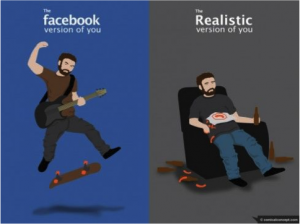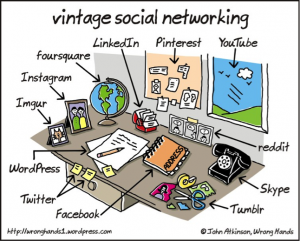Not too long ago, I relentlessly teased my 21-year-old sister when she revealed her strategies for achieving maximal positive feedback on Facebook photos. There were timing basics—don’t post on Friday or Saturday nights because no one is checking. She also recommended sensitivity to time zones so as to avoid an entire coast being asleep when your picture is posted. There was even attention to Facebook’s sharing algorithms. Rather than posting and tagging other people in the photo simultaneously, it was wise to wait on the tagging. That way, once several hours had passed and the photo filtered into the depths of everyone’s news feeds, a new tag would prompt it to resurface front and center, in turn receiving a fresh wave of “likes”. And wait, there’s more–after almost 10 years on the site, she could even report back to me her most liked Facebook post ever. It all sounded…ridiculous.
I chalked it all up to our (whopping) three-year age difference—kids these days and their all-consuming social media obsessions. Back when I was in college…
And then several months later I sent my sister the most shameful text message of all time (for the record, I was only allowed to publish Emily Schacter’s Facebook Strategy Tell-All under the condition that I owned up to my own social media low-point). One morning last month, I posted what I thought to be quite an entertaining picture on Facebook. But, to my surprise, twenty minutes passed by and I had zero likes on the photo. Forty minutes, still nothing. Maybe I accidentally posted it with extra privacy restrictions? Nope. An hour. And still, even my two most loyal Facebook like-ers (I’m looking at you, Mom and Dad) hadn’t given my picture some love. Desperation took over.
I had cracked, and in doing so I lost my privileges to ever mock Emily for her Facebook posting habits again. Why in the world did I care so much about an un-liked photo? Was it really a lack of likes, rather than the four hours a week I dedicate to watching Bachelor in Paradise, that I was concerned made me look like a loser? When and how did Facebook likes become such a valuable social currency? For better or for worse, I am hardly alone in my experience. Recent research has documented how technology, and social networking sites (SNS; e.g., Facebook, Instagram) in particular, have given rise to a growing obsession with impression management and self-presentation online. Whether it’s searching for the perfect Instagram photo filter or carefully crafting a humblebrag Facebook status about a recent publication (personal confession: guilty on both counts), users frequently engage in selective self-presentation strategies to portray an “ideal self” through social media (Chou & Edge, 2012; Manago, Graham, Greenfield, & Salimkhan, 2008). In turn, we seek out social approval and positive feedback in the form of comments and likes. Reflecting upon my own social media usage (e.g., the-text-that-shall-not-be-named) and observing the online behavior of others, I’ve become increasingly interested in understanding the psychological consequences of these online experiences. Put simply, are our relationships with social media healthy?
With steep increases in the rates of social media usage over the past several years, there has been a growth in psychological research addressing this very question. As with most things I’ve discussed on this blog, the answer is not as simple as yes or no. Although social networking sites offer unique opportunities for interpersonal communication and self-expression, there may also be psychological costs of certain online behaviors. Here I’ll first review some evidence for the dark side of social media, then turning to the bright side of things.
When considering the potential negative effects of social media, there appear to be risks associated with certain types of online activity, rather than SNS usage at large. For example, social media use can be particularly maladaptive when it occurs in the form of passive browsing. That is, when users spend time on sites like Facebook and Instagram exclusively looking at other people’s photos and profile content, it can trigger a sense of exclusion, envy, and loneliness (Krasnova, Wenninger, Widjaja, & Buxmann, 2013). This sort of online surveillance activity can also promote feelings of inadequacy or jealousy in the context of romantic relationships, especially among users who subject themselves to the Facebook-stalking of exes (Marshall, 2012; Muise, Christofides, Desmarais, 2009). Within friendships, excessive monitoring of others’ activities can also trigger feelings of exclusion (e.g., “Why wasn’t I invited to this party??”) and, in turn, increase social anxiety. This phenomenon has come to be known as “FOMO,” fear of missing out, and initial research has found that individuals reporting higher levels of FOMO spend more time on Facebook and experience more negative mood (Przybylski, Murayama, DeHaan, & Gladwell, 2013).
Relatedly, on sites like Facebook, users frequently engage in social comparison processes that can then generate emotional distress. For example, viewing profile pictures of attractive people elicits more negative emotions than viewing photos of less attractive people, and more photo-related activity on Facebook (e.g., posting pictures, viewing friends’ photos) is related to body image disturbances in teen girls (Meier & Gray, 2014). Social comparison on social networking sites, under certain circumstances, has also been associated with mental health problems. In a recent study of adolescents, Nesi and Prinstein (2015) considered the role of technology-based “social comparison and feedback-seeking” (SCFS) in the development of depressive symptoms. They found that adolescents (8th and 9th graders) who reported engaging in more social comparison and feedback-seeking behavior online (e.g., “I use electronic interaction to see what others think about how I look”; “I use electronic interaction to compare my life with other people’s lives”) experienced more depressive symptoms a year later, even when accounting for earlier levels of depression as well as concurrent technology use. Moreover, this positive association was particularly strong for girls and for students who were less popular with their peers at school. Given that profiles on social networking sites often portray positively distorted portrayals of users, teens who engage in social comparisons online may come to feel like “everyone is happier than me,” and this feeling may be especially pronounced for teens who are already less popular among their peers.
Before you conclude it’s time to deactivate your Facebook/Instagram/SnapChat/Twitter/Tumblr, it’s also worth acknowledging how social media can offer important benefits to our psychological health. Facebook in particular provides opportunities for increased social capital, social interaction with others, and identity development. In terms of social capital, studies on college campuses have shown that certain types of Facebook use allow for students to be better integrated into the college community, insofar as it provided a venue for acquiring information about social events and for strengthening social ties with newly introduced classmates (Ellison, Steinfield, & Lampe, 2007). Facebook also allows users to maintain preexisting relationships and even strengthen close friendships and familial ties through novel expressions of intimacy (e.g., photo sharing, wall posting; Watkins & Lee, 2010).
In terms of identity development and psychological health, research suggests that young users report increased self-esteem and general well-being following instances of positive feedback on social networking sites (Valkenburg, Peter, & Schouten, 2006). Relatedly, results from a 2009 survey of college students indicated that the heaviest Facebook users were also most satisfied with their lives and exhibited greater social and political engagement (Valenzuela, Park, & Kee, 2009). Studies have even demonstrated that just several minutes of looking at one’s own Facebook profile resulted in a significant self-esteem boost among participants (Gonzales & Hancock, 2011; Toma & Hancock, 2013)! Facebook and related social networking sites, by allowing users to selectively browse through and reflect on their best moments, can promote self-affirmation (i.e., awareness of one’s own value). These findings suggest that social networking sites like Facebook, by promoting self-expression and emphasizing social connections with friends and family, also foster the preservation of self-worth (Toma & Hancock, 2013).
Considering this body of research as a whole, what’s the verdict? As with many technological developments, social media presents both positives and negatives. Although certain online activities may promote an unhealthy preoccupation with social comparison and feedback seeking, social networking sites like Facebook also offer opportunities to strengthen preexisting relationships and even our own sense of identity. So, if you find yourself issuing pleas to family members for Facebook likes, try shifting the focus away from your virtual audience. Instead, use SNS profiles to reflect on meaningful aspects of your own identity and social connections with cherished others (e.g., treasuring all your adorably nostalgic #tbt photos).
References
Chou, H. T. G., & Edge, N. (2012). “They are happier and having better lives than I am”: the impact of using Facebook on perceptions of others’ lives. Cyberpsychology, Behavior, and Social Networking, 15(2), 117-121.
Ellison, N. B., Steinfield, C., & Lampe, C. (2007). The benefits of Facebook “friends:” Social capital and college students’ use of online social network sites. Journal of Computer‐Mediated Communication, 12(4), 1143-1168.
Gonzales, A. L., & Hancock, J. T. (2011). Mirror, mirror on my Facebook wall: Effects of exposure to Facebook on self-esteem. Cyberpsychology, Behavior, and Social Networking, 14(1-2), 79-83.
Krasnova, H., Wenninger, H., Widjaja, T., & Buxmann, P. (2013). Envy on Facebook: A Hidden Threat to Users’ Life Satisfaction? Wirtschaftsinformatik, 92.
Manago, A. M., Graham, M. B., Greenfield, P. M., & Salimkhan, G. (2008). Self-presentation and gender on MySpace. Journal of Applied Developmental Psychology, 29(6), 446-458.
Marshall, T. C. (2012). Facebook surveillance of former romantic partners: associations with postbreakup recovery and personal growth. Cyberpsychology, Behavior, and Social Networking, 15(10), 521-526.
Meier, E. P., & Gray, J. (2014). Facebook photo activity associated with body image disturbance in adolescent girls. Cyberpsychology, Behavior, and Social Networking, 17(4), 199-206.
Muise, A., Christofides, E., & Desmarais, S. (2009). More information than you ever wanted: Does Facebook bring out the green-eyed monster of jealousy?.CyberPsychology & Behavior, 12(4), 441-444.
Nesi, J., & Prinstein, M. J. (2015). Using Social Media for Social Comparison and Feedback-Seeking: Gender and Popularity Moderate Associations with Depressive Symptoms. Journal of abnormal child psychology, 1-12.
Przybylski, A. K., Murayama, K., DeHaan, C. R., & Gladwell, V. (2013). Motivational, emotional, and behavioral correlates of fear of missing out. Computers in Human Behavior, 29(4), 1841-1848.
Toma, C. L., & Hancock, J. T. (2013). Self-affirmation underlies Facebook use. Personality and Social Psychology Bulletin, 39(3), 321-331.
Valenzuela, S., Park, N., & Kee, K. F. (2009). Is There Social Capital in a Social Network Site?: Facebook Use and College Students’ Life Satisfaction, Trust, and Participation1. Journal of Computer‐Mediated Communication, 14(4), 875-901.
Valkenburg, P. M., Peter, J., & Schouten, A. P. (2006). Friend networking sites and their relationship to adolescents’ well-being and social self-esteem. CyberPsychology & Behavior, 9(5), 584-590.
Watkins, S. C., & Lee, H. E. (2010). Got Facebook? Investigating what’s social about social media. Unpublished manuscript, Department of Radio, Television and Film, The University of Texas at Austin, TX. Retrieved from http://www. theyoungandthedigital.com/wpcontent/uploads/2010/11/watkins_lee_facebookstudy-nov-18. pdf.


